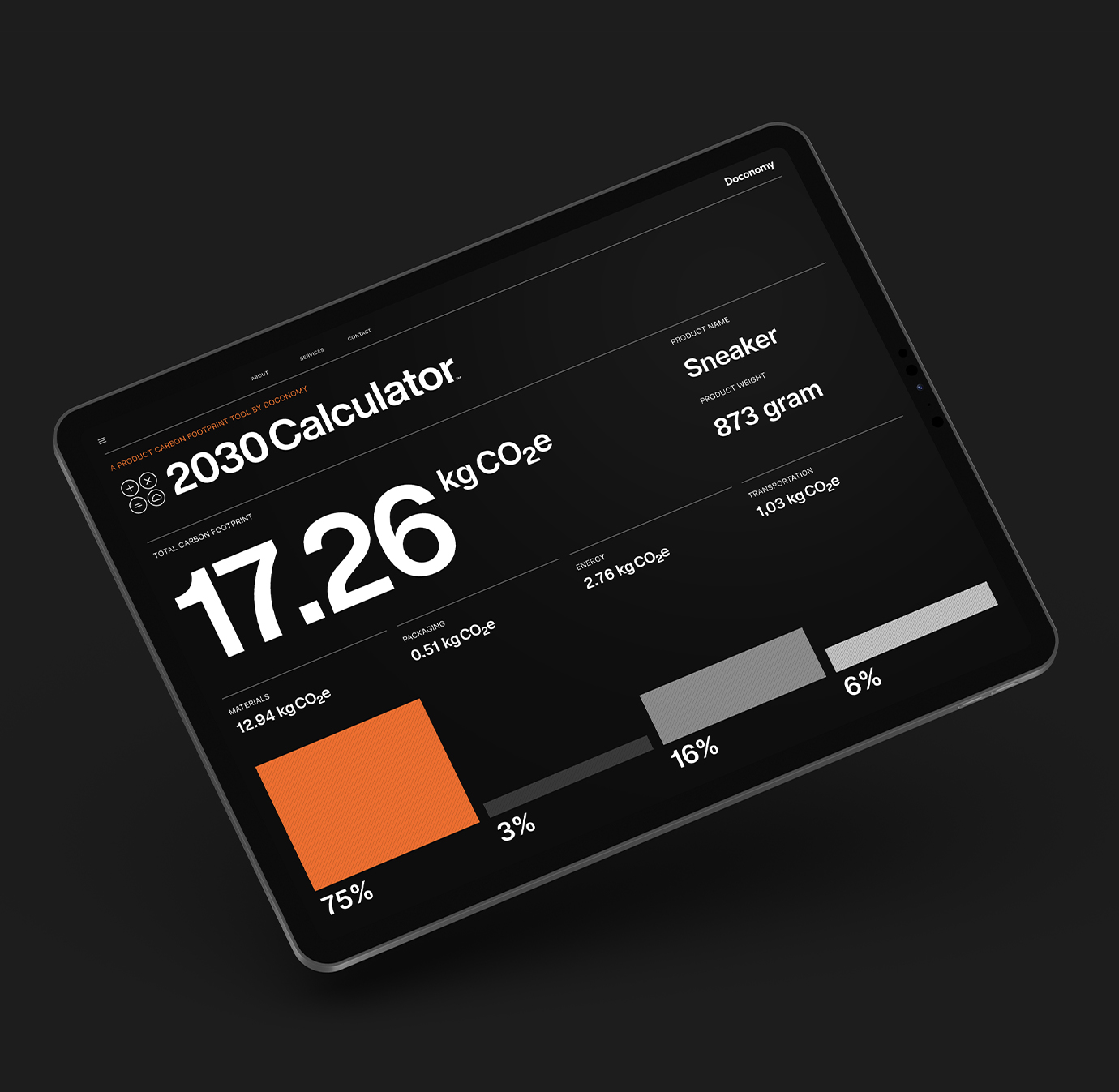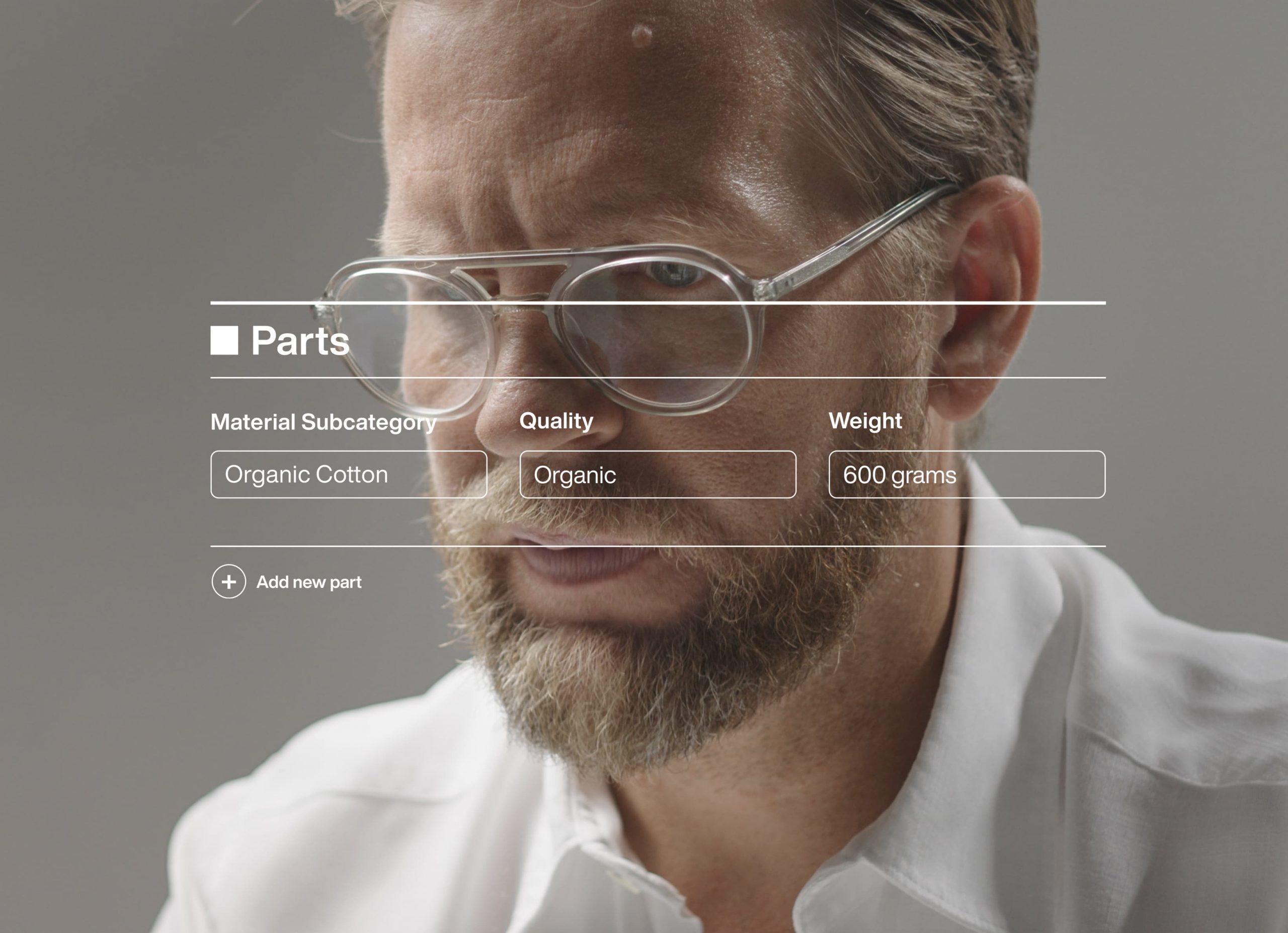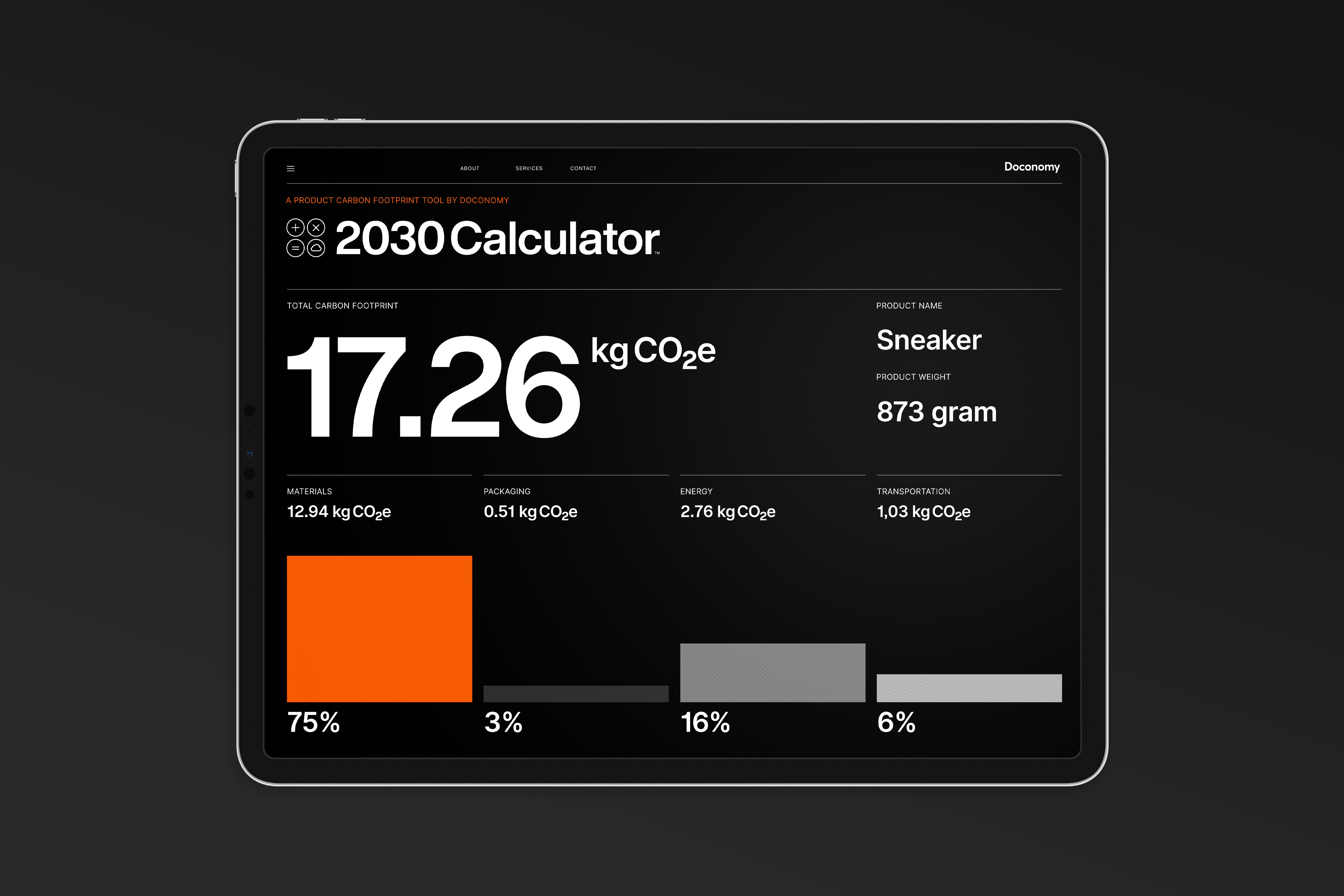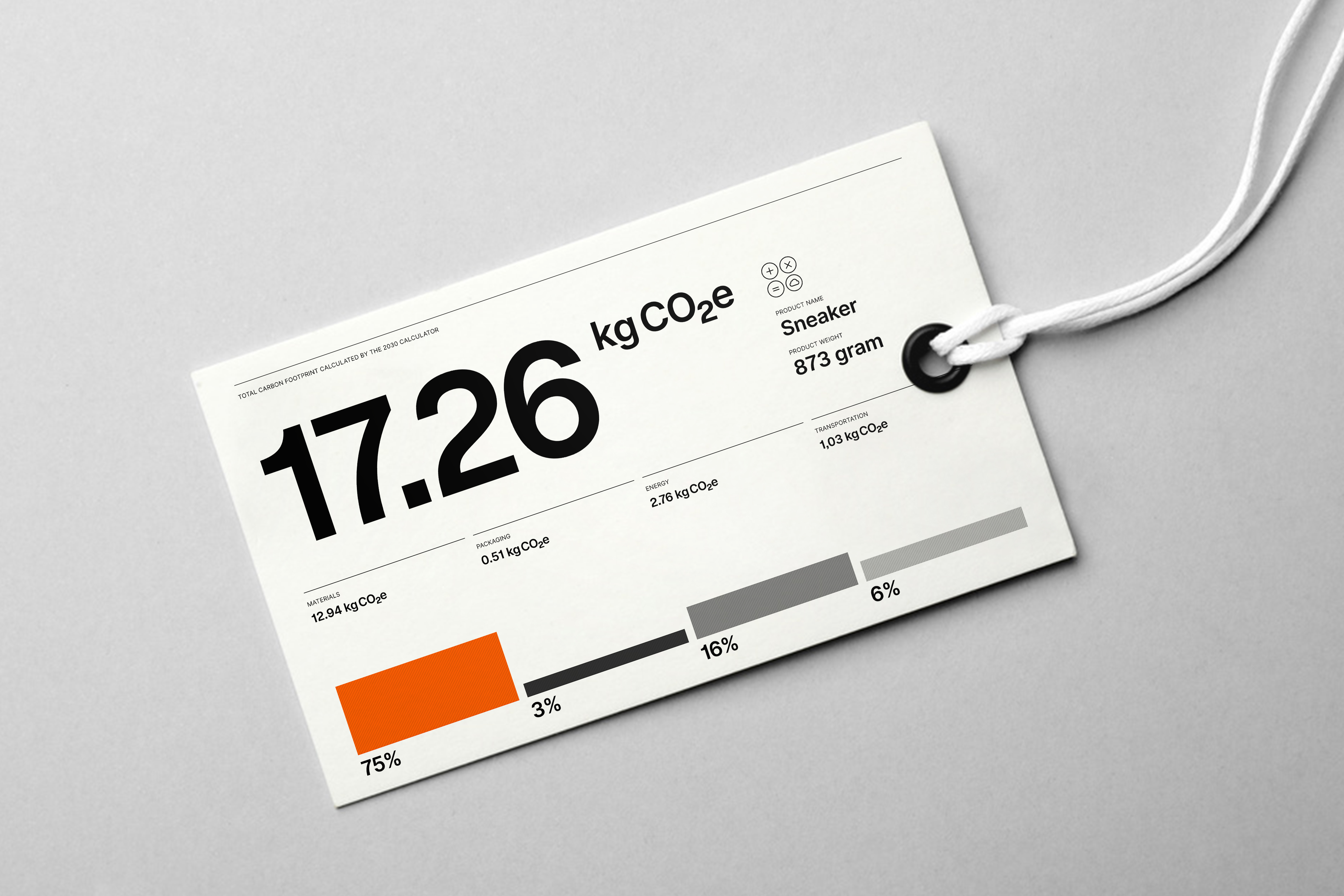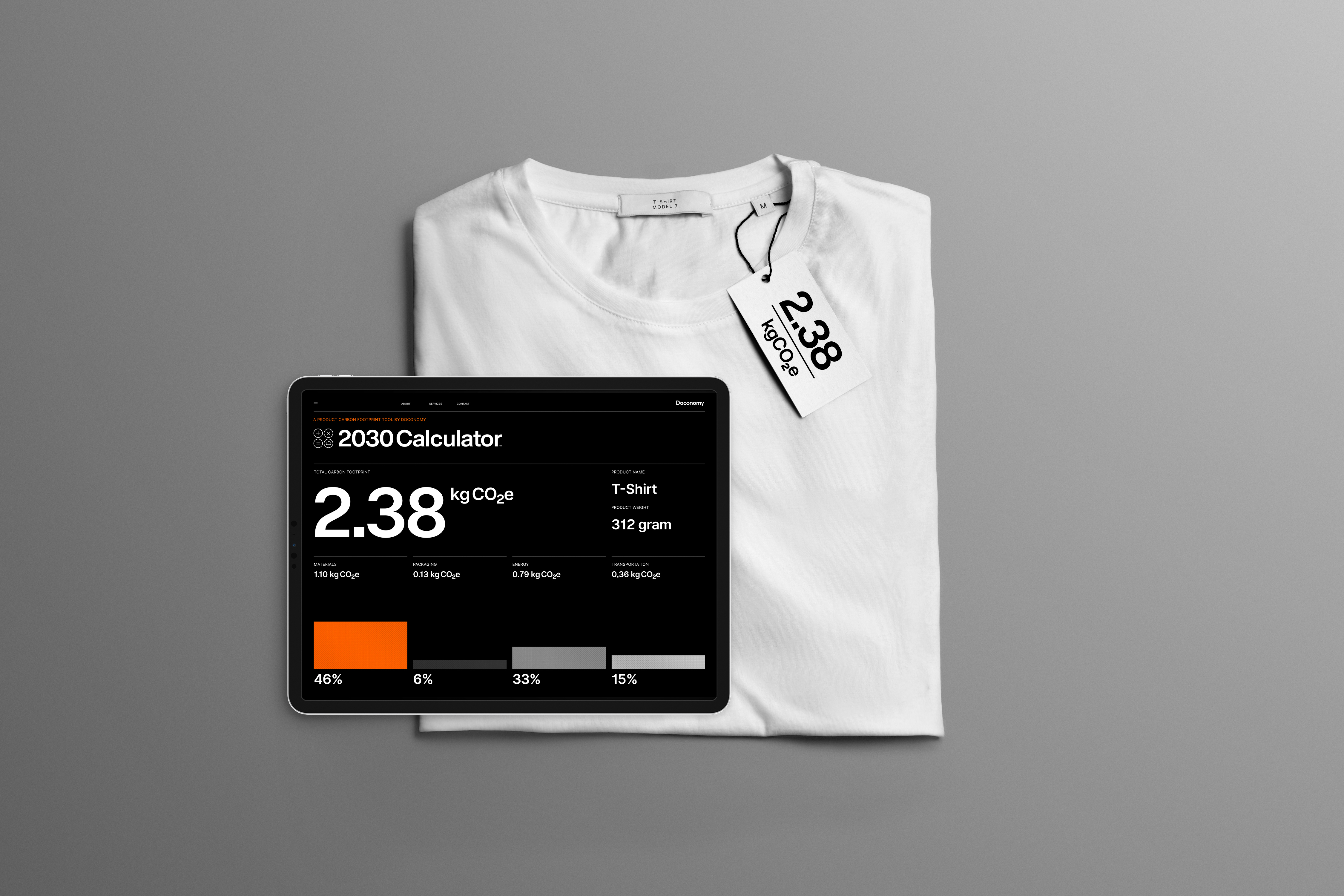The 2030 Calculator
Product Carbon Footprint Tool
Version 1.0
The 2030 Calculator is a new service that radically simplifies the process of calculating a products carbon footprint by eliminating all previous hurdles, activating the brand's commitment towards sustainable production and responsible consumption.
It can be used by any product brand or manufacturer to quickly calculate the carbon footprint of their products based on the emissions created from manufacturing and transport up until the point of sale. The 2030 Calculator uses unique emissions factors for each of the product parts, material, packaging, transportation, as well as the energy consumed in the manufacturing process to determine its calculations. All calculations are cradle-to-gate and self-declared.
In short: It’s the tool all responsible brands can use to do their part for a more sustainable future and business.

A Calculator to Democratize Impact Transparency
Today both brands and consumers realize the importance of connecting consumption with their impact on the planet. Many believe labels that openly disclose the individual carbon footprint of a product have the potential to change the way we consume forever. Much like food labelling did for the food industry.
However today consumers have little clue about how their consumption affects the planet. With carbon labelling consumers would be able to determine between low and high impact products and more importantly understand how price and quality relates to production and transportation methods. The 2030 Calculator (version 1.0) was launched by Doconomy with the ambition for product brands (and material suppliers), to better understand the carbon footprint of the products and materials they produce as well as provide the transparency that will allow consumers to make informed consumption choices.
Calculations made by using the 2030 Calculator carbon footprint tool, are calculated on average emissions factors for materials, energy consumption and transportation based on product category, total weight of product, the weight of unique materials used in each product (or packaging) part, location and distances between supplier, manufacturing facility and distribution center and modes of transport between each as well as the source of energy used in production. Calculations cover the cradle-to-gate and are self-declared.
The Importance of Carbon Labelling
With The 2030 Calculator brands can help accelerate an era of transparency and responsibility making sure consumers are able to make informed purchase decision. When consumers understand a product's specific carbon footprint it will help them understand how their consumption affects the planet, and motivate brands establish low impact sustainable production as a competitive edge.
Impact transparency is key
The 2030 Calculator helps establish a shared responsibility between consumers and producers, turning impact transparency into a competitive edge.
Carbon labelling will change the way we consume
The 2030 Calculator helps brands to facilitate the introduction of carbon labelling in order to drive a much-needed shift towards transparency and responsible production.
Product carbon footprint intelligence
The 2030 Calculator is a product carbon footprint tool that enables brands to calculate the carbon footprint of their products, thus creating a foundation for more informed choices for both brands and consumers.
Leveling the playing field for conscious consumption calls for comparable product carbon footprint calculations for all
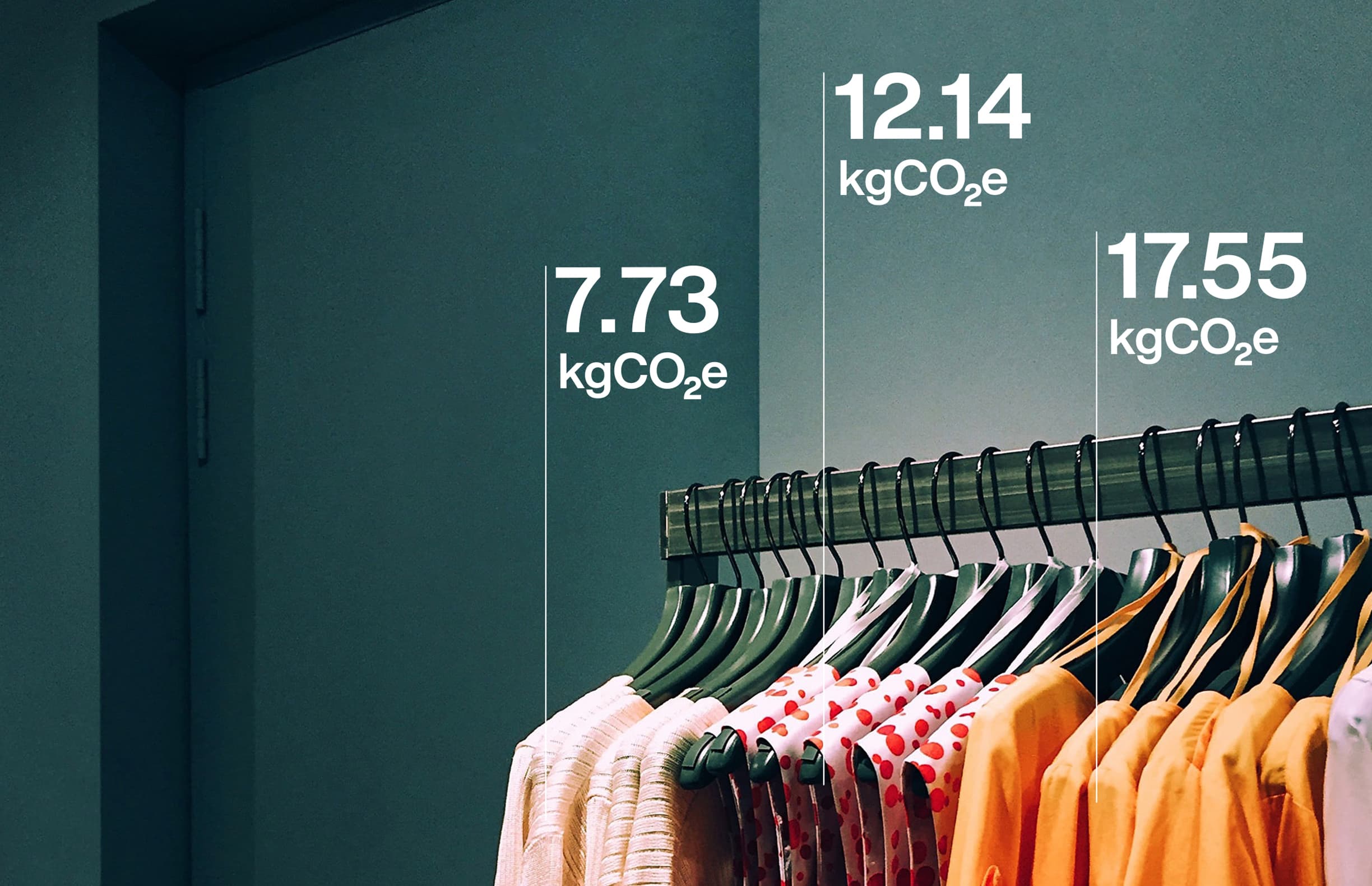
Calculating the carbon footprint of products has long been difficult and costly, with regular LCA (Life Cycle Assessment) calculations taking weeks to complete per product. This creates a significant hurdle for brands that aspire to become more transparent. The challenge of calculating the carbon footprint of products is especially difficult for small- and medium-size brands, which is a problem since many are willing to use carbon labeling as a competitive edge. The 2030 Calculator can generate a result in minutes, at no cost, thus empowering brands to be more transparent. As a result, consumers will be motivated to choose lower-impact products, the playing field will be leveled, and labels made comparable.
The 2030 Calculator aims to enhance impact transparency and democratize product carbon footprint calculations. Doconomy is committed to ensuring shared responsibility by bridging the gap between consumers and producers in order to reduce emissions by 50% by 2030. This will be accomplished through the enabling of fast and reliable carbon footprint labeling for all product brands and manufacturers. In turn, this will ignite and substantiate a new dialogue around consumption, preference and production. The goal is to shape a new form of insight-driven loyalty based on transparency and comparability. This is already sought by world-leading brands such as Unilever, Logitech and Oatley among others at the forefront.
The initial beta version of the 2030 Calculator, using emissions data from more than 300 impact factors, is currently optimized for apparel, but will also allow for the calculation of other products. Future upgrades will include consumer product categories such as food and beverages, furniture, and consumer electronics. The tool does not aim to replace full life-cycle assessments or other established calculation models. However, independent testing has generated a high accuracy rate, making reliable calculations accessible for everyone.
Doconomy aims to accelerate collaboration between industries through leading brands that are acting as catalysts for positive change. The 2030 Calculator has the capability as a point-of-reference platform, and moreover, aims to be fueled by the ambitions of many as an effort of co-creation to future-proof the planet. The calculator is both a tool, as well as an open invitation to all other stakeholders to contribute and collaborate.
“Until now, life-cycle assessments and carbon footprint calculations depended on disparate and proprietary methodologies. These usually do not cover the same range of values or even life-cycle phases, which makes direct carbon footprint benchmarking and comparisons across products and brands extremely challenging. By creating The 2030 Calculator we aim to not only democratize carbon labeling, but also facilitate like-for-like comparisons between similar products.” Shawn McKell, Head of Platform Strategy, Doconomy
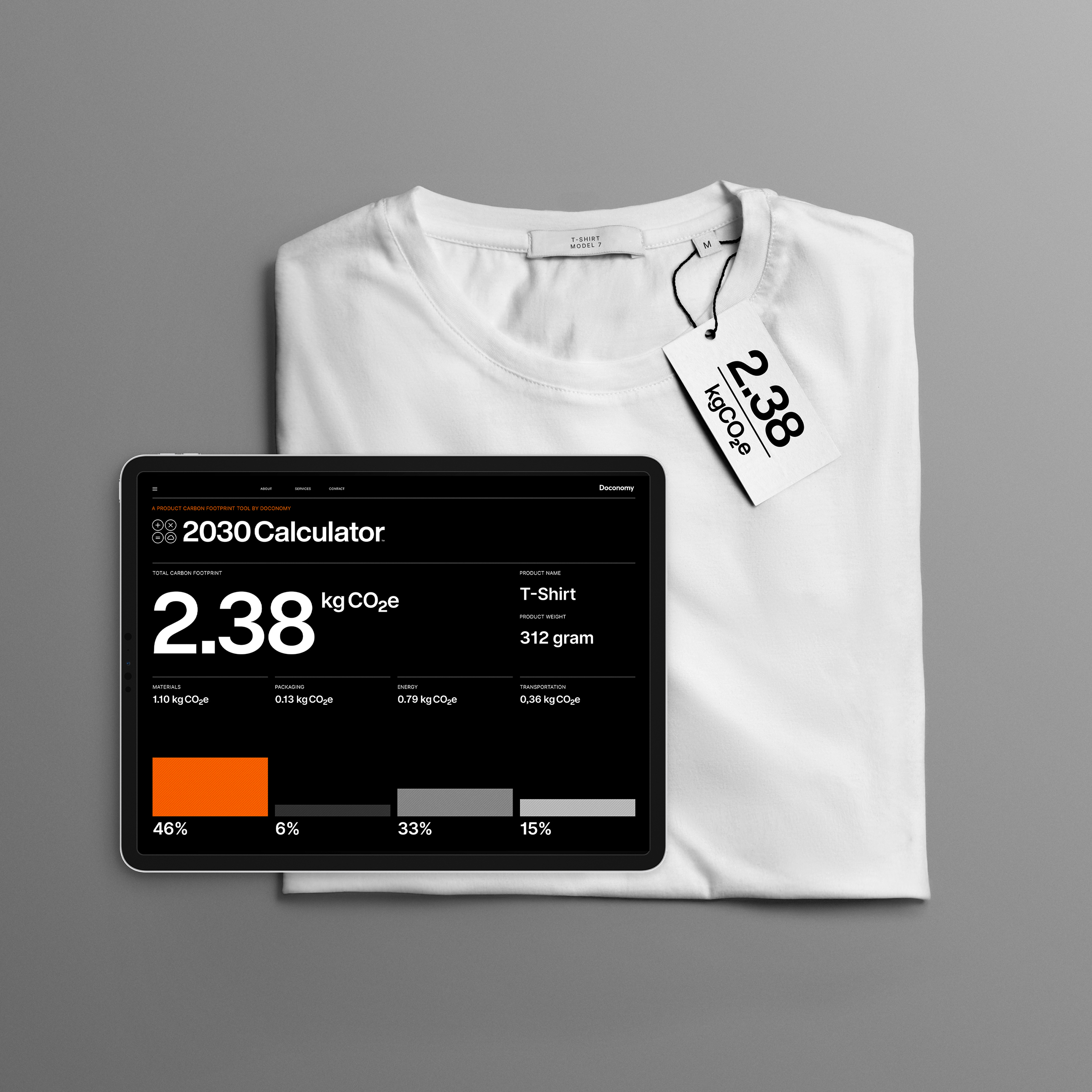
Beta testing by brands
Advisory board

Miguel Naranjo is Programme Officer with the United Nations Climate Change Secretariat in Bonn, Germany. He has worked as process engineer and environmental supervisor for a transnational corporation and joined the UN Climate Change Secretariat in 2011. He focus on capacity building for mitigation and carbon market mechanisms, and promoting climate action among the private sector and other stakeholders.

Shawn McKell has broad and deep experience developing innovative, digital products and solutions. Shawn has led multi-disciplinary teams while a Product Designer and Creative Director at Microsoft in the U.S. as well as User Experience Director at technology consultancy Sapient in London and Munich.

Kristina is Mastercard’s first Chief Sustainability Officer. A catalyst for change, she is helping shape Mastercard’s business strategy through its commitment to sustainability, which comes from the long-held belief that doing good for society helps them do well as a company. As CSO, she collaborates with leadership across the business to integrate sustainability initiatives and position them to be enterprise wide drivers of growth – in advancing inclusive growth, ensuring a workforce that is inspired by a sense of purpose, limiting its impact of climate change, and putting ethics, data privacy and security first.

Petronella Panérus is the CEO of advertising agency Åkestam Holst. Petronella is committed to building a more sustainable, inclusive and diverse world, and has won numerous awards for her gender equality and inclusion efforts. She lives in Stockholm with her 11 year old daughter Effi.

Jessica Bjurström, works for the Committee for Sweden’s participation at Expo 2020 in Dubai. Fifteen years of working as CEO and business developer in the communications industry creates an ideal foundation for her work as a sustainability focused Marketing & Communications Director to position Sweden at the World Expo.
Presskit
About Doconomy
Doconomy, founded in Sweden 2018, provides digital solutions to help track and measure the carbon footprint. Doconomy's service, DO, a mobile banking app, manages savings and promotes sustainable consumption. The Åland Index impact calculations in DO use data, covering 99% of global market cap, through a unique partnership with Trucost, a part of S&P Global. Through Doconomy’s collaboration with the United Nations Climate Change Secretariat (UNFCCC), to educate and engage individuals around climate action, additional innovative tools to explain our impact are also developed. Doconomy utilizes innovation, data and design to support consumers change of behaviour by enabling well informed choices, in turn shaping responsible consumption.

